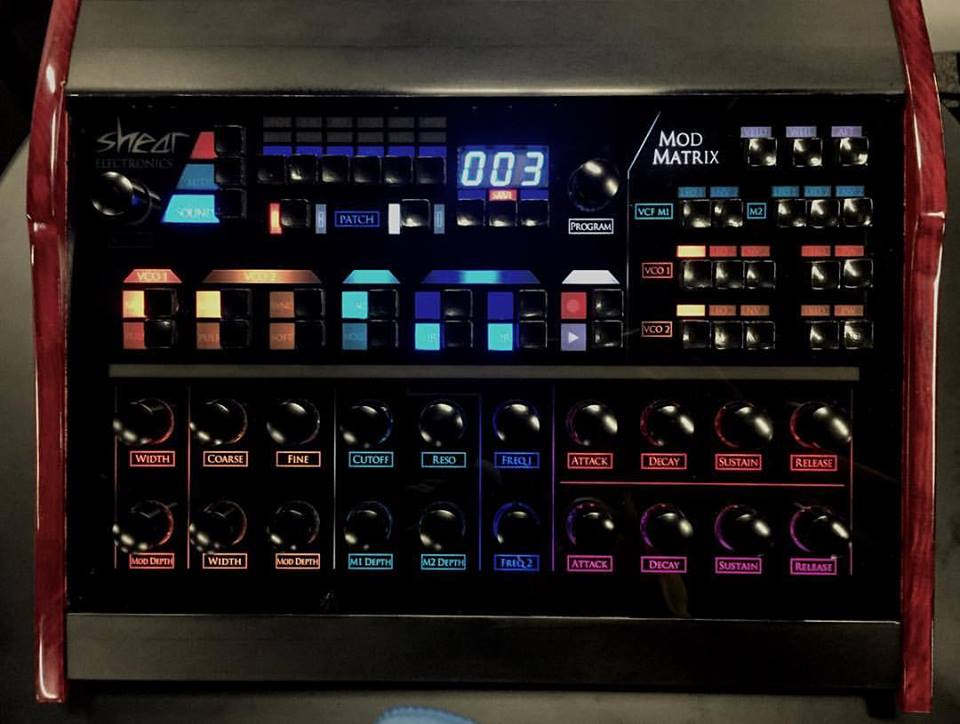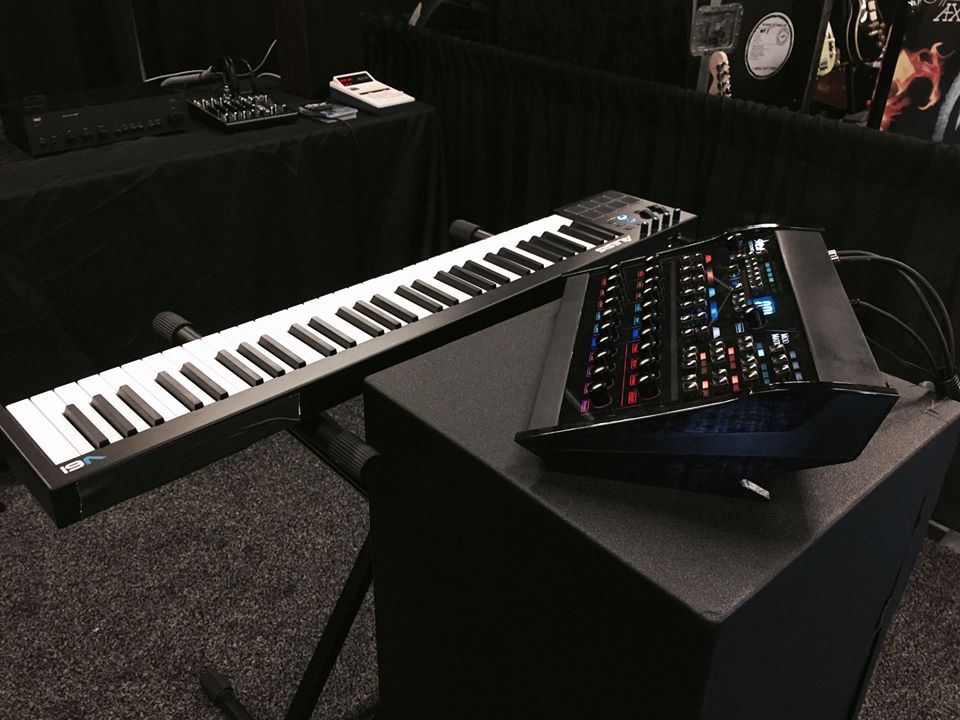Filter on ALL, SYNTH, DRUM, SAMPLER or MISC |
Total list currently 2405 items in 330 Brands |
Shear Electronics | Relic-6 |
Description | The Relic-6 from Shear Electronics is based on the circuitry Oberheim's OB-X. synthesizer. The knobs are interactive and touch sensitive. The signal path is all analog with a digitally controlled interface and features two voltage controlled oscillators with Saw and Pulse waves variable width as well as sync.The original Oberheim 12db 2-pole lowpass filter is retained and can layer two sounds at once unlike the original OB-X. There are of 3000 transistors inside an all glass front panel with hand crafted wood side panels and aluminum metal case. Centuries ahead of 1984 In 1978, Sequential Circuits shocked the world with a synthesizer control panel that could recall saved sounds. By 1984, synth designers had perfected the digital-recall analog panel. Almost four decades later, the best control panels are hardly different from the designs of the 1980s. We still have to choose between quantized LED rings and analog dials that can't reveal saved settings. So we started from scratch, and built a front panel to end all front panels. Endless Dials... Analog Style Every function has its own dial. As soon as you touch one of the solid aluminum knobs, a 12-inch colored bar shines through the black-glass panel to reveal the current setting with more precision and smoothness than analog dials could dream of. And every dial is endless, so settings never jump. Our high-resolution encoders are manufactured by Alps in Japan. They feel as smooth as old-school potentiometers felt when they were brand new. Leading in the Material World A musical instrument can be a lifelong investment, and striking build quality is almost as important as the sound itself. We’ve seen a lot of front panels, but we’ve never seen one carved out of jet-black solid glass. The controls are all physical, with silky-smooth dials and heavy-duty mechanical switches. But labels and indicators shine through the panel with a soft futuristic glow. The classic wood side panels of vintage equipment were also due for an upgrade. Ours are beautifully hand-finished by an artisan woodworker. Naturally, you can have them in any color you like. Discrete analog extravagance Our voice card isn’t really dipped in solid gold. Aside from that, no expense was spared. In our search for unparalleled sonic character, we looked to one of the most revered synthesizers ever made:The Oberheim OB-X. We dusted off archived schematics of this 1979 behemoth and painstakingly recreated the entire signal path. Every single component of it. Voltage-Controlled Oscillators Forget about DCOs, NCOs & PCM. There’s only one type of circuit that resonates with the freedom of a guitar string and the power of a live brass section. Still, some VCOs are better than others. We’re using: 36 Resistors 12 Transistors 4 Capacitors 1 Diode In each oscillator. Excessive? Absolutely. But this old-school complexity creates a sonic depth that’s impossible to describe. Once you hear it, you'll never want to give it up. Legendary State-Variable Filter First appearing in Oberheim’s groundbreaking SEM synth module, this voltage-controlled lowpass filter is arguably the greatest polysynth filter of all time.The gentler 12dB/octave curve kept all the biting resonance of the 24dB Minimoog filter, but added more air and sizzle. We built it the old-fashioned way, right down to a faithful Texas Instruments clone of the notoriously gritty RCA 3080 chip. Back in 1974, the famous SEM filter required ultra-precise silver-mica capacitors to produce its signature resonance. Today, silver-mica capacitors have become ultra-rare. Of course, we used them anyway. Scorching in Stereo Old-school VCAs weren't always perfect, but they were never boring. In the days before crystal-clear amplifier chips, subtle distortion used to color your sound whether you liked it or not. On top of that, the earliest polysynths had knobs to manually pan individual voices for a striking three dimensional effect. After all the scorching texture of the oscillators and filter, our voice card’s output stage delivers the finishing blow. And with two discrete VCAs for each voice, the stereo field is flexible, powerful, and programmable. Envelopes with Curtis Curves The Curtis Electromusic CEM3310 Envelope Generator shaped control voltages for the Prophet-5, Memorymoog, and the entire Oberheim OB-series.The original chip was discontinued in 1985, but we’ve examined authentic datasheets and recreated its distinctive curves with a 40 kHz output rate at 14-bit resolution. The unique attack stage rose to 6.5 volts, but was truncated at 5 volts—not quite exponential, not quite linear. Our emulation matches it perfectly. Often, rise & fall times were glaringly inconsistent from one voice to the next. Our ‘fatness’ parameter lets you dial up the vintage looseness when you want it, or stick with timing accuracy when you need it. |
| Brand | Shear Electronics |
| Model | Relic-6 |
| Device | Synth |
| Type | Desktop |
| Engine Type | Analog |
| Engine | VCO |
| Voices (max) | 6 |
| Multitimbral | 2 |
| Oscillators | 2 |
| Engine Detailed | 2 VCO, Pulse, Saw Down, Square |
| Filter (VCF) | 1 12dB Slope (2-pole), Low Pass, Resonance |
| Envelope (VCA) | 1 ADSR |
| Memory | 32 |
| Keys | 0 |
| Key type | N/A |
| Velocity | N/A |
| Aftertouch | N/A |
| Midi | I-O |
| Produced: | 2017 |
| Legend: | Obvious | Y: Yes, N: No, N/A: Not Applicable | |
| VCO | Voltage Controlled Oscillator | DCO | Digital Controlled Oscillator |
| LFO | Low Frequency Oscillator | Sub | Sub Oscillator |
| VCF | Voltage Controlled Filter | VCA | Voltage Controlled Amplifier |
| Velocity | As with a piano, the harder you hit a key, the louder the sound, unlike most organs which always produce the same loudness no matter how hard you hit a key. | Aftertouch | Pressing a key after you activated it. Channel Aftertouch, no matter which key, it will send a Channel message. Poly Aftertouch, sends the pressure per key instead of the whole channel. |
| Values for OSC, LFO, Filter, Envelope are per voice unless stated otherwise. | |||




